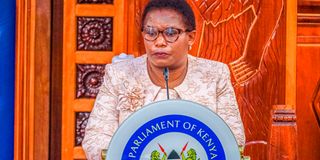Premium
Facing third impeachment, Mwangaza now wants court to quash law allowing MCAs to reintroduce charges

Meru Governor Kawira Mwangaza. She faces the Senate over her county assembly impeachment.
Meru Governor Kawira Mwangaza wants the High Court to declare unconstitutional a law that allows MCAs to re-introduce failed impeachment charges against a governor after three months.
The governor wants the Constitutional and Human Rights Court to rule that Section 33 (8) of the County Government Act violates the rights of elected governors and the electorate.
The section allows county representatives to reintroduce a motion for impeachment on similar charges three months after a Senate vote fails to remove the governor.
“If a vote in the Senate fails to result in the removal of the governor, the Speaker of the Senate shall notify the speaker of the concerned county assembly accordingly and the motion by the assembly for the removal of the governor on the same charges may only be re-introduced to the Senate on the expiry of three months from the date of such vote.” the county government act reads.
Ms Mwangaza, who is fighting her third impeachment in the Senate in two years, says the rule exposes governors to double jeopardy where one can routinely be tried for the same offence every three months.
It is asking Justice Edward Muriithi to rule that the assembly is guilty of exercising its powers in an illegal, excessive and abusive manner.
Through lawyers Elias Mutuma and Ashaba Mark, the governor says the legal loophole has emboldened the MCAs to engage in "routine and perpetual impeachment motions" against a popularly elected governor.
“It is not fair that after you have been popularly elected as a governor, you now face impeachment motions every three months,” argued Mr Ashaba.
Ms Mwangaza says her rights as guaranteed under Article 50(1) of the Constitution of Kenya are being violated, particularly the right to a fair hearing, arguing that the county assembly is biased against her.
She is therefore asking the court to protect her from being subjected to double jeopardy in what she claims is a politically motivated trial.
“Article 50(1) of the Constitution provides that every person has the right to have any dispute that can be resolved by the application of law decided in a fair and public hearing before a tribunal or, if appropriate, another independent and impartial tribunal or body.
“The Petitioner avers that the past and present conduct of Meru County Assembly demonstrates that it lacks capacity to act independently and as an impartial tribunal in as far as the impeachment of the Governor is concerned,” said Mr Ashaba.
However, the MCAs through lawyer Ndegwa Njiru insist that the High Court did not have jurisdiction to hear Ms Mwangaza’s petition and asks her to withdraw it.
“Binding precedent forbids this honourable court from granting the reliefs sought in the application and the petition.
“This Honourable Court is not the Constitutionally ordained forum for interrogating the merits, demerits, veracity or falsity of the allegations outlined in the impeachment motion,” he said.
Ms Mwangaza also wants the High Court to cite Speaker Ayub Bundi, Clerk Jacob Kirari and MCA Zipporah Kinya for contempt of court, saying they ignored orders over the intended fourth impeachment.
She wants the trio sentenced to a six-month civil jail term and fined, for the role they played in the withdrawal of the motion.
Ms Mwangaza says that despite the conservatory orders barring the MCAs against deliberating on the motion, Ms Kinya went ahead and withdrew the same and introduced a fifth impeachment motion.
The motion has since been endorsed by the MCAs and is before the Senate.
Ms Mwangaza invited the court to punish the three to ensure the MCAs “abide by the rule of law and to restore and affirm the court’s dignity.”
She said the action by the MCAs went against Article 181 of the Constitution, since the High Court was expected to address claims of forgery of signatures of some MCAs in papers supporting the impeachment motion.
Justice Muriithi fixed the ruling for September 5, 2024.





